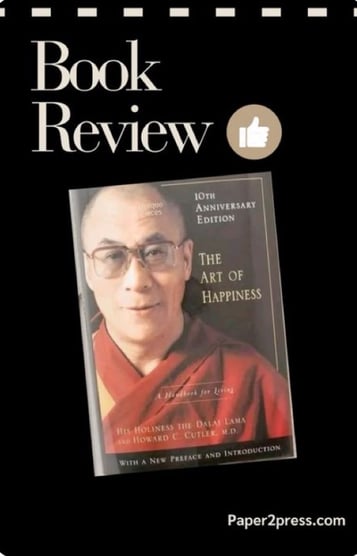Book Review: The Art of Happiness
This book offers profound insights into the nature of happiness and practical strategies for cultivating it. Through lessons on compassion, mindfulness, acceptance, and the importance of relationships, the book serves as a guide for individuals seeking to enhance their well-being and live more fulfilling lives. The teachings encourage a holistic approach to happiness, emphasizing both inner development and connection with others.
READING IS REWARDING
✏️ T.T. Dayoff
What a great book! It explores the nature of happiness and how individuals can cultivate it in their lives. Through discussions that blend Buddhist philosophy with psychological insights, the book provides practical guidance on achieving lasting happiness. Here are several key lessons and insights from the book:
1. Happiness is a Skill: The Dalai Lama emphasizes that happiness is not a fleeting emotion but a skill that can be developed through practice and intention. Instead of relying on external circumstances for happiness, individuals can train their minds to foster positive thoughts and attitudes.
2. The Role of Compassion: Compassion is central to the Dalai Lama's teachings. He argues that cultivating compassion for others leads to greater happiness. By caring for others and recognizing our shared humanity, we can create more meaningful connections and reduce feelings of isolation.
3. Understanding Suffering: The book discusses the inevitability of suffering as part of the human experience. The Dalai Lama encourages readers to acknowledge suffering, both in themselves and in others, as a way to develop empathy and resilience. Understanding suffering helps in cultivating a deeper sense of happiness.
4. The Importance of Relationships: The Dalai Lama highlights that healthy relationships are crucial for happiness. Positive interactions with family, friends, and community contribute to emotional well-being. Investing time and energy in nurturing these relationships is essential for a fulfilling life.
5. Mindfulness and Presence: Practicing mindfulness and being present in each moment is a recurring theme. The Dalai Lama advocates for mindfulness as a way to appreciate life as it unfolds, reducing anxiety about the future and regret over the past. This practice enhances overall happiness.
6. Acceptance and Letting Go: The authors discuss the importance of acceptance in achieving happiness. Accepting situations as they are, rather than how we wish they would be, can reduce frustration and disappointment. Letting go of attachments and expectations fosters inner peace.
7. The Impact of Thoughts: The book emphasizes the power of thoughts in shaping our emotions and experiences. The Dalai Lama encourages readers to cultivate positive, constructive thoughts while recognizing and transforming negative thought patterns. This shift in perspective can lead to greater happiness.
8. Finding Meaning and Purpose: The Dalai Lama suggests that a sense of meaning or purpose in life significantly contributes to happiness. Engaging in activities that align with one’s values and passions fosters a sense of fulfillment and joy, whether through work, relationships, or altruistic efforts.
9. Balancing Material and Spiritual Pursuits: While the Dalai Lama acknowledges the role of material well-being in happiness, he emphasizes that true happiness comes from inner peace and spiritual fulfillment. Striking a balance between material pursuits and spiritual growth is essential for lasting happiness.
10. Practicing Forgiveness: The book discusses the transformative power of forgiveness. Holding onto grudges and resentment can hinder happiness. The Dalai Lama encourages readers to practice forgiveness, both toward themselves and others, as a way to release negative emotions and promote emotional healing.
This book offers profound insights into the nature of happiness and practical strategies for cultivating it. Through lessons on compassion, mindfulness, acceptance, and the importance of relationships, the book serves as a guide for individuals seeking to enhance their well-being and live more fulfilling lives. The teachings encourage a holistic approach to happiness, emphasizing both inner development and connection with others.
Let’s Connect
contact@paper2press.com
© 2024. All rights reserved.
Thank you for supporting this small business.















